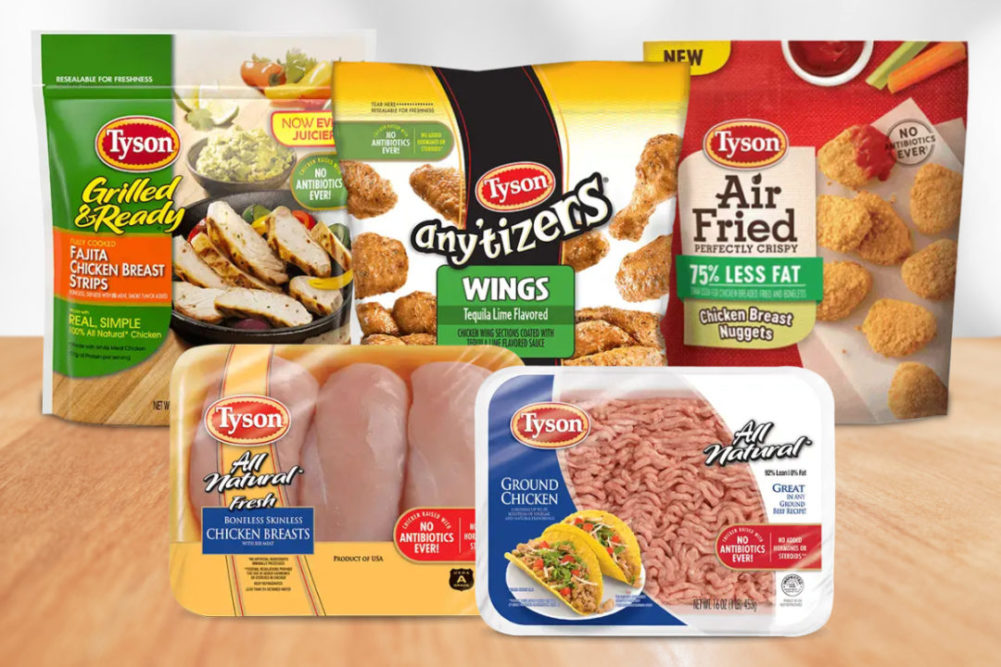SPRINGDALE, ARK. – Despite lackluster performance by its pork business unit, Tyson Foods Inc.’s first quarter performance showed promise as the impact of the pandemic begins to tamp down market volatility. Net income for the first fiscal quarter ended Jan. 2, 2021, totaled $472 million, down from the previous year’s $509 million. This year’s quarterly earnings were equal to $1.94 on the common stock, 28% higher than the same period in fiscal 2020, at $1.58 per share.
Sales for the quarter decreased 3% to $10.5 billion from $10.8 billion the previous year.
Dean Banks, president and chief executive officer, highlighted the strength of the company’s operating income in Q1, which exceeded $1 billion, despite historic market challenges, including COVID-19.
“This performance was driven by higher earnings in our Prepared Foods, Beef, and Chicken segments and demonstrates our effectiveness in addressing customer and consumer needs, while continuing to manage the ongoing effects of the global pandemic,” Banks said.
“As we navigate continued market volatility, our multi-protein portfolio creates the fuel for disciplined investments in higher margin, higher growth opportunities ahead. We will continuously seek to remove unnecessary costs from the business and invest in the right areas,” he added.
Sales in the company’s Prepared Foods segment was relatively flat in Q1, at $2.11 billion compared to $2.14 billion during the same period last year as volume decreased 8.8% and prices increased 7.5%. Operating income increased to $266 million compared to $180 million during the first quarter of 2020.
Retail growth was offset by a reduced demand in the foodservice channel related to the impact of COVID-19.
“Average sales price increased in the first quarter due to favorable product mix and the pass through of increased raw material costs,” according to the company. “Operating income increased due to lower commercial spend and favorable product mix partially offset by increased operating costs, including a $35 million increase in raw material costs, as well as production inefficiencies related to COVID-19,” Tyson said.
First-quarter chicken segment sales dipped 14% from last year’s $3.29 billion to $2.83 billion, while quarterly operating income increased 33%, from $78 million in fiscal 2020 to $104 million in 2021. In comments during a conference call with financial analysts, Stewart Glendinning, chief financial officer, attributed the $320 million reduction in sales largely to the company’s poultry litigation accrual which it previously stated would be reflected in Q1.
“Volumes were down 7% relative to the same period last year, primarily due to lost foodservice sales, but were offset by bright spots in our retail value-added categories, as well as strong sales to certain national account QSR chains,” Glendinning said.
He added that sales and volume in the chicken segment continue to be negatively impacted by demand shifts from foodservice to retail and pandemic-related operational hiccups, including higher-than-normal absenteeism rates at processing plants.
“Higher levels of absenteeism and turnover have created inefficiencies in our operations as they leave us short of team members to fully staff our plants and also drive higher levels of overtime,” Glendinning said.
To address the labor issue, the company is implementing changes that include pay increases and implementing automation and technology to supplement the less desirable, higher-turnover in-plant jobs.
In the Beef segment, sales increased 4% for the quarter, from $3.84 billion to $3.99 billion. The company’s beef business reported a 48% increase in operating income during Q1, from $363 million in in 2020 to $528 million in 2021. Volumes for the quarter were up 5.6% and Glendinning said the results reflect a $55 million gain related to the recent discovery of fraud from one of Tyson’s cattle suppliers, which also skewed the previous year’s financial reporting. The segment’s operating margins ultimately improved by 13.2% for the first quarter.
Tyson’s Pork segment performance reflected a softening compared to the same period last year, with sales ticking up about 4% from $1.38 billion to $1.44 billion in 2020, however operating income declined 40% from last year’s $195 million to $116 million in the first quarter of 2021. Glendinning said lower production volumes of about 3% resulted from the company temporarily closing its pork plant in Storm Lake, Iowa. Additionally, the segment endured production inefficiencies, incurred COVID-19-related operating costs and higher live animal prices that could not be overcome with higher pricing. Operating margins declined to 8.1% in the first quarter.
Looking ahead, the company expects to generate revenues between $42 billion and $44 billion. Glendinning said the company’s capital expenditures have been revised to between $1.3 billion and $1.5 billion for the year to ensure growth in Tyson’s capacity across its business segments.
“Our multi-protein portfolio delivered strong first quarter results, then will create the fuel for disciplined investments and higher-margin, higher-growth opportunities ahead, and we will seek opportunities to remove unnecessary costs and invest in the right areas,” Banks said in his concluding remarks to the analysts.


